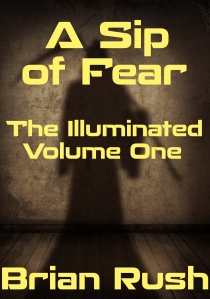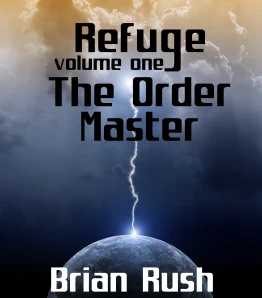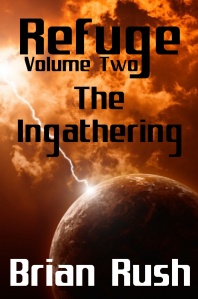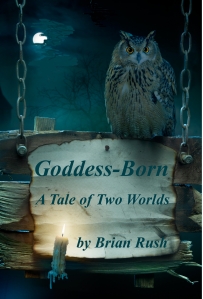 I’m working on two novels these days. One of them is A Sip of Fear, the first story in the new series The Illuminated which I described in the last post. The other is The Rapier, volume three of Refuge. Since Refuge, unlike most of my work, is science fiction as well as fantasy, I’m able to do more in the way of incorporating speculation about where we’re going as a species and a civilization. The two alien races incarnate as human beings give me a good platform for this, as both of them lived in advanced, high-tech societies before they blew each other to bits.
I’m working on two novels these days. One of them is A Sip of Fear, the first story in the new series The Illuminated which I described in the last post. The other is The Rapier, volume three of Refuge. Since Refuge, unlike most of my work, is science fiction as well as fantasy, I’m able to do more in the way of incorporating speculation about where we’re going as a species and a civilization. The two alien races incarnate as human beings give me a good platform for this, as both of them lived in advanced, high-tech societies before they blew each other to bits.
One passage in The Rapier has Amanda Johnson, the Andol leader, visiting with Deirdre Kane, leader of the Humanity Faction that’s struggling to keep the human race independent of both alien races. The third person in the meeting is Terrence Franklin, the only human being to have the Refuge spell that lets the Andol and Droon reincarnate after each death with all their memories intact. Terrence got his spell from a Droon in the fourteenth century, shortly after the aliens arrived. Here’s how that conversation goes:
“Do you mind if I grill you on a couple of things? To get a second opinion after Deirdre’s.”
“Not at all. I have nothing to hide.”
“Hmm,” said Deirdre, “that’s a switch.”
“Be nice,” said Terrence, looking sideways at Deirdre.
“Well, she has a point,” said Amanda. “Actually, I have quite a few things to hide, but the reason the Andol are here and what we want aren’t among them. The answers are simple. We’re here because our home world was destroyed and our species is extinct. We sought a refuge by magic. We found one. Now we’re trying to survive here and help humanity achieve its potential.”
“See, Amanda, it’s that second part that bothers me,” said Deirdre. “We’d like to achieve our potential without meddling by aliens — you or the Droon.”
“I understand,” said Amanda. “Really, I do understand. You’re in a very different place now than you would have been if we hadn’t come. But sooner or later, Deirdre, you would have faced the decision you face now. As far as we know, there are only three possible ways to go.” She held up a finger. “You can mature as the Andol did.” A second finger. “You can mature as the Droon did.” A third. “Or you can destroy yourselves. Most intelligent species take the third path.”
Deirdre shook her head. “How many intelligent species did you find out there in space?”
“Including extinct ones, about fifty or so.”
“How many that weren’t extinct?”
“Ourselves, the Droon, and the four species the Droon had enslaved.”
“And the slaves never matured because they never got the chance, right?”
Amanda sipped her tea. “Right. But —”
“So you know of two mature species, you and the Droon. And from that you decide there are only two ways to get there?”
“What third way could there be?”
“Amanda,” said Terrence, “what do you mean by ‘mature’?”
“A mature civilization,” Amanda said, “has a sustainable society. It has abolished war by establishing a global government, and it’s gone green, as you would put it — no danger of self-destruction either by war or by exhausting resources or poisoning the biosphere.”
“Hmm. So that’s it? Global government and environmentalism?”
“Essentially, yes, but there are many changes to culture involved with both of those — in one direction or the other.” She paused. “There’s a lot of resistance to those changes from people who fear modernity and want to cling to old ways of doing things. Some of them want to make money without considering other people, let alone the biosphere. Some cling to old religious traditions or to nationalism. Maturation involves getting past that resistance, and there are two ways that can happen. Either people come to their senses and change their ways, or an enlightened elite takes complete control and makes them do it. The first is the Andol path. The second is the path of the Droon. Can you think of any other way?”
Deirdre never answers Amanda’s question, because Emily comes into the room ready to advance the plot. But it’s a good question nonetheless.
I’ve long believed that human society is in a transition as profound as the one that took our ancestors from foraging and hunting to farming, leading to classical civilization in all its glories and horrors. That deceptively simple change created a completely new paradigm of society, with formal government, organized religion, class structure, patriarchy, and slavery, none of which had existed (except in embryonic form) when humans lived in small hunter-gatherer bands. Since roughly the sixteenth century, we’ve been moving away from this civilized way of life, what I call the Classical Civilized Paradigm, into something radically different that I call the Advanced Civilized Paradigm. It might also be called the Mature Civilized Paradigm. The transition to the Classical Civilized Paradigm flowed from an ability that humans gained which they hadn’t had before: the ability to control their food supply so as to produce a food abundance and allow population growth. It also flowed from the inherent limitations of this ability: that it took a lot of work, and that it required settling in one place.
Formal government and organized religion were needed as systems of social control because the increased number of people living close together created frictions. Class structure flowed from the increase of wealth, along with the need for lots of work to generate the food supply, which also resulted in slavery. The possibility of population growth created a necessity of population growth in competition with other societies, and that led to patriarchy, because women who control their own fertility tend to have fewer children. And that’s why we see this pattern developing universally throughout all agrarian civilizations, including ones that had no contact with each other, in both the old world and the new.
The transition to the Advanced (or Mature) Civilized Paradigm is also being driven by new abilities. We can produce wealth with little or no work. We can communicate with each other instantly over huge distances. And there are two darker abilities we’ve gained, the ability to destroy our civilization in war, and the ability to undermine the natural support base of human life. From this flow two things, a possibility and a necessity.
We can, finally, have an egalitarian society in terms of wealth and political power, and a genuinely democratic government.
We must end our propensity to kill each other on a massive scale and to behave irresponsibly towards the biosphere.
The first of these has driven all of the political and social movements of the past centuries towards equality in terms of gender, race, religion, and other characteristics that have divided us in the past. It has driven the movements for democracy and for socialism, for the abolition of slavery, and generally all of the goals and efforts labeled “progressive” in political discourse, with the exceptions of the anti-war movement and environmentalism, which instead are driven by the second one, the “must.”
As Amanda noted, maturation meets plenty of resistance from people who are uncomfortable with these changes to society, and some of the strongest resistance comes from traditional religion. All of the so-called “great” religions of the world emerged during the period when we lived under the Classical Civilized Paradigm. While all religions have an ultimate, timeless source in spiritual experience, all of them represent an interface between that experience and ordinary life, and the nature of ordinary life has changed radically since the Buddha meditated under the tree, or Jesus was crucified, or the Prophet Muhammad fled to Medina. Many of the views and attitudes and moral precepts taught by these traditional religions have therefore become obsolete.
I’ll go into the ramifications in more depth in the next post, coming soon.







